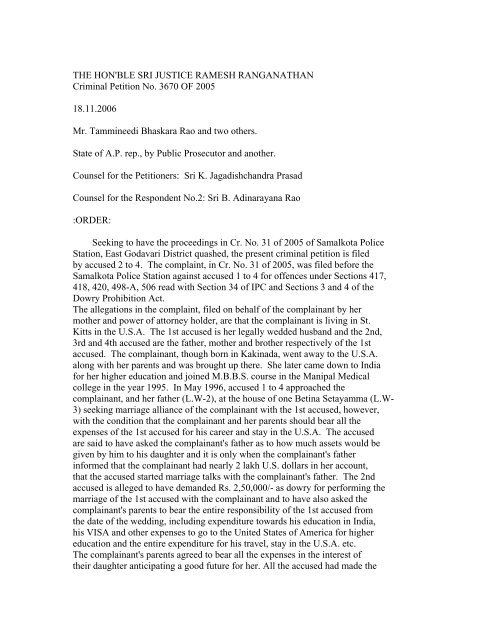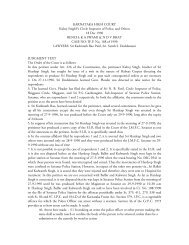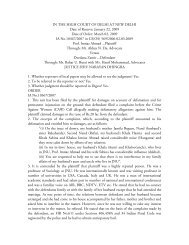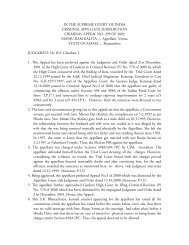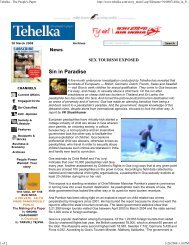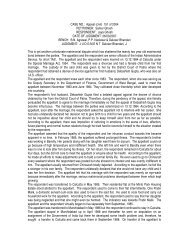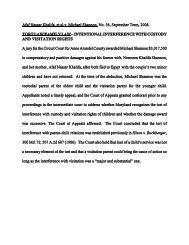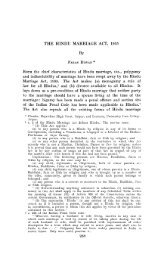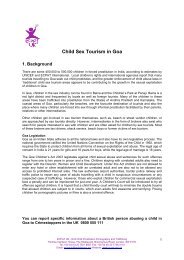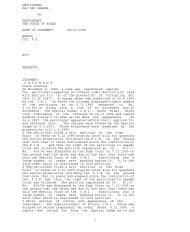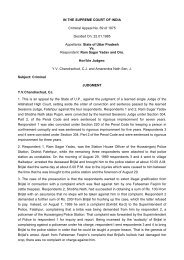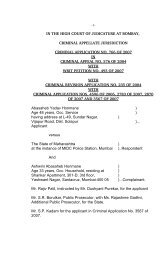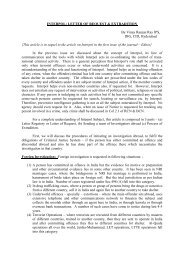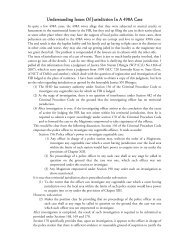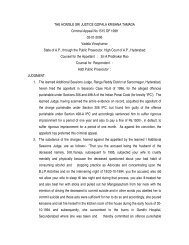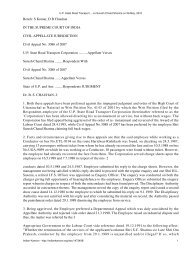AP HC Quotes Dowry Prohibition Act In Judgment: 2005 - IPC 498A
AP HC Quotes Dowry Prohibition Act In Judgment: 2005 - IPC 498A
AP HC Quotes Dowry Prohibition Act In Judgment: 2005 - IPC 498A
Create successful ePaper yourself
Turn your PDF publications into a flip-book with our unique Google optimized e-Paper software.
THE HON'BLE SRI JUSTICE RAMESH RANGANATHAN<br />
Criminal Petition No. 3670 OF <strong>2005</strong><br />
18.11.2006<br />
Mr. Tammineedi Bhaskara Rao and two others.<br />
State of A.P. rep., by Public Prosecutor and another.<br />
Counsel for the Petitioners: Sri K. Jagadishchandra Prasad<br />
Counsel for the Respondent No.2: Sri B. Adinarayana Rao<br />
:ORDER:<br />
Seeking to have the proceedings in Cr. No. 31 of <strong>2005</strong> of Samalkota Police<br />
Station, East Godavari District quashed, the present criminal petition is filed<br />
by accused 2 to 4. The complaint, in Cr. No. 31 of <strong>2005</strong>, was filed before the<br />
Samalkota Police Station against accused 1 to 4 for offences under Sections 417,<br />
418, 420, 498-A, 506 read with Section 34 of <strong>IPC</strong> and Sections 3 and 4 of the<br />
<strong>Dowry</strong> <strong>Prohibition</strong> <strong>Act</strong>.<br />
The allegations in the complaint, filed on behalf of the complainant by her<br />
mother and power of attorney holder, are that the complainant is living in St.<br />
Kitts in the U.S.A. The 1st accused is her legally wedded husband and the 2nd,<br />
3rd and 4th accused are the father, mother and brother respectively of the 1st<br />
accused. The complainant, though born in Kakinada, went away to the U.S.A.<br />
along with her parents and was brought up there. She later came down to <strong>In</strong>dia<br />
for her higher education and joined M.B.B.S. course in the Manipal Medical<br />
college in the year 1995. <strong>In</strong> May 1996, accused 1 to 4 approached the<br />
complainant, and her father (L.W-2), at the house of one Betina Setayamma (L.W-<br />
3) seeking marriage alliance of the complainant with the 1st accused, however,<br />
with the condition that the complainant and her parents should bear all the<br />
expenses of the 1st accused for his career and stay in the U.S.A. The accused<br />
are said to have asked the complainant's father as to how much assets would be<br />
given by him to his daughter and it is only when the complainant's father<br />
informed that the complainant had nearly 2 lakh U.S. dollars in her account,<br />
that the accused started marriage talks with the complainant's father. The 2nd<br />
accused is alleged to have demanded Rs. 2,50,000/- as dowry for performing the<br />
marriage of the 1st accused with the complainant and to have also asked the<br />
complainant's parents to bear the entire responsibility of the 1st accused from<br />
the date of the wedding, including expenditure towards his education in <strong>In</strong>dia,<br />
his VISA and other expenses to go to the United States of America for higher<br />
education and the entire expenditure for his travel, stay in the U.S.A. etc.<br />
The complainant's parents agreed to bear all the expenses in the interest of<br />
their daughter anticipating a good future for her. All the accused had made the
complainant believe that the 1st accused would look after her well and would<br />
live happily with her as husband and wife. The engagement, of the complainant<br />
and the 1st accused, took place at Kakinada in May, 1995. At that time the<br />
complainant's parents also got the "Lagna Patrika" imprinted of a six sovereign<br />
gold plate and gave it to the accused. The 2nd accused also collected<br />
Rs.50,000/- from the complainant's father apart from dowry and at that time all<br />
the accused had promised, and had made the complainant believe, that the 1st<br />
accused would look after and live happily with her as husband and wife.<br />
Believing their words, the parents of the complainant agreed to spend the huge<br />
amount required for his stay in the U.S.A. to pursue his career. The marriage,<br />
between the complainant and the 1st accused, was solemnized on 19th December,<br />
1996 at Ladies club Building, Kakinada. On the demand of the accused, the<br />
complainant's father's elder brother (L.W-4) paid Rs. 2,00,000/- to the 2nd<br />
accused in the presence of L.Ws 1 to 3 and 5 to 8 and the same was recorded in a<br />
video cassette. The complainant's parents gave a diamond ring to the 1st<br />
accused, apart from silver articles, and spent Rs.5,00,000/- towards the<br />
marriage. The marriage was also registered with the Registrar of Marriages at<br />
Kakinada. Ever since the beginning, the complainant found that the 1st accused<br />
was reluctant to live with her and was deliberately avoiding her company. The<br />
complainant was genuine in her approach towards the accused, and was trying to<br />
understand his feelings, but the 1st accused never tried to lead a normal<br />
married life with her. The 1st accused used to ask for money and the<br />
complainant had no other go but to draw money from her account. The accused had<br />
drawn the entire amount, from the complainant's account, from time to time, on<br />
some pretext or the other. The complainant was confused over his behaviour and<br />
was unsure as to whether he liked her at all or had got married to her for the<br />
sake of her money or only with the aim of going to the U.S.A. Whenever the<br />
complainant asked the 1st accused about his behaviour he used to talk to her in<br />
a rude manner, gave her an ultimatum not to question his behaviour and also<br />
insisted that she not to reveal his attitude to any one else. The 1st accused<br />
is said to have threatened not to live with her if his green card status was not<br />
arranged by the complainant and her parents. The complainant went into a state<br />
of dejection. The 1st accused is said to have deserted the complainant for<br />
months together without reason and without communicating with her. He remained<br />
cold and detached towards her. She had to undergo suffering due to the mental<br />
cruelty inflicted by him on her by his behaviour. Accused 2 and 3 supported the<br />
1st accused and abetted him in his acts of cruelty towards the complainant. The<br />
1st and 2nd accused retained with them the gold "Lagna Patrika", silver<br />
articles, gold kumkuma bharini etc. After her wedding, it was decided that the<br />
1st accused would go to Manipal to prepare for his exams and live with the<br />
complainant. However the 1st accused expresses his unwillingness either to go<br />
to Manipal or to join the complainant there and wanted to stay at Hyderabad to<br />
prepare for his examination. The complainant's parents advised her to<br />
discontinue her studies in Manipal Medical College and to pursue her family life<br />
with the 1st accused. Though the complainant's father had spent more than<br />
60,000 U.S. Dollars for her education in the Medical College, they advised her
to discontinue her medical education for the sake of her matrimonial life and to<br />
join the 1st accused at Hyderabad. To their shock and surprise, the 1st accused<br />
declined to take her to Hyderabad to live with him stating that it would be a<br />
great hindrance to his education as he would lose concentration in his studies.<br />
He is said to have advised the complainant to stay with her parents in the<br />
United States of America and pursue her studies there until his behaviour<br />
changed. Though the complainant requested the 1st accused to take her along<br />
with him, the 2nd accused is said to have supported his son and as there was no<br />
alternative she went to the U.S.A. to live with her parents waiting for the 1st<br />
accused to get his VISA soon to come to the U.S.A. and join her in matrimony.<br />
The 1st accused deceptively promised the complainant, and her parents, that he<br />
would join the complainant in the U.S.A. after completing his studies in <strong>In</strong>dia<br />
as he wanted the complainant's parents to pay his examination fee etc in <strong>In</strong>dia<br />
and for his VISA to the U.S.A. Believing his promise, the complainant's parents<br />
provided the accused with financial support for his studies, paid his<br />
examination fees twice, firstly for ECFMG at Hyderabad and later at Bangkok.<br />
With the VISA support arrangements being made by the complainant's parents, the<br />
1st accused reached the U.S.A. in July, 1998 to continue his higher education by<br />
joining the complainant. However, even in the U.S.A, the 1st accused<br />
deliberately avoided her company on some pretext or the other. After a few<br />
months in the U.S.A, he went to the United Kingdom for studies promising to join<br />
the complainant after his return. The complainant's parents bore the entire<br />
expenditure of 50,000 U.S. Dollars for his higher education, travel and living<br />
expenses in <strong>In</strong>dia, U.S.A, U.K. etc, as the 1st accused had informed them that,<br />
only on completion of his studies, would he permit the complainant to join him<br />
at their matrimonial home. Accused 1 to 3 also demanded that the complainant<br />
and her parents make arrangements for the job related VISA to the U.S.A. for the<br />
4th accused otherwise they would not allow the 1st accused to live with the<br />
complainant. The complainant's parents arranged both for a VISA and a job for<br />
the 4th accused in the U.S.A. through their relatives. The complainant, and her<br />
parents, came to know later that the 1st accused had been taking the advice of<br />
immigration lawyers in the U.S.A. to secure his future stay there and, in order<br />
to obtain a permanent green card for which a citizen spouse of the U.S.A. must<br />
sign all the supporting documents, the first accused had obtained the<br />
complainant's signature for this purpose. The complainant, and her parents,<br />
made all necessary arrangements in this regard as they thought that, after he<br />
secured his green card, the 1st accused would look after the complainant<br />
comfortably. The 1st accused, technically making it appear as though he lived<br />
with the complainant in the United States of America for two years, though he<br />
was living separately from her on the pretext of his studies, presented his<br />
papers for securing the green card. He had, however, cheated the complainant<br />
and her parents as also the Government of the United States of America's<br />
immigration authority for the purpose of obtaining a permanent green card. The<br />
complainant and her parents were initially unaware, of the intention of the 1st<br />
accused, that he had married the complainant only to get a permanent green card<br />
in the U.S.A, that he was gaining a period of seven years of stay in the U.S.A.
to get a green card as also to take his brother, the fourth accused, to the<br />
U.S.A. After obtaining all the supporting documents from the complainant and<br />
her parents, and having presented his green card papers, the 1st accused openly<br />
challenged during 2003 that he would never take the complainant into his fold at<br />
any cost and that he would not give divorce to the complainant on the ground of<br />
fraud until he got a green card from the U.S.A. government. The complainant<br />
filed a petition for nullity of marriage against the 1st accused for his acts of<br />
cruelty in the U.S.A. The annulment petition was rejected on the ground of<br />
being barred by limitation according to the State Laws. Thereafter the<br />
complainant came to <strong>In</strong>dia in September 2003, along with her mother L.W-1, and<br />
filed O.P. No. 25 of 1994 against the 1st accused for annulment of marriage<br />
which is said to be pending on the file of the Principal Senior Civil Judge,<br />
Kakinada. Later the complainant left <strong>In</strong>dia to Caribbean Islands for her<br />
education. The complainant still hoped that the 1st accused would realise his<br />
mistakes and come back to her. The complainant, and her parents, recently came<br />
to know that the 1st accused was not fit for married life and was therefore<br />
avoiding the complainant. Though she gave all support to him, and his family<br />
members, the 1st accused used his marriage with the complainant only as a<br />
stepping stone to gain entry into the United States of America to get a<br />
permanent green card through her and only to earn huge amounts of money for<br />
himself and his brother. The 1st accused had stolen all documents, including<br />
diaries and passport of the complainant, since he had planned to abandon the<br />
complainant once and for all. The 1st accused, along with the other accused, is<br />
alleged to have committed an offence of cheating under the <strong>In</strong>dian Penal Code.<br />
It is alleged that the permanent green card is worth lakhs of U.S dollars<br />
earning capacity to the 1st accused and the complainant realized that obtaining<br />
the same was his goal after getting married to her. The 1st accused, after<br />
presenting all his permanent green card papers signed by her, proceeded to<br />
permanently desert the complainant filing a separation case against her in the<br />
U.S courts and in this process the 1st accused had joined the other accused and<br />
had committed various offences punishable under the <strong>In</strong>dian Penal Code.<br />
According to the complainant, the accused had committed an offence under Section<br />
417 <strong>IPC</strong> since the 1st accused, right from the beginning of his marriage with the<br />
complainant, had used their marriage only as a spring board for him, and his<br />
brother the 4th accused, to migrate to the U.S.A, without any intention to live<br />
with her and with a view to extract huge sums of Rs.25,00,000/- by way of dowry,<br />
marriage expenses, including the huge expenditure for his studies at<br />
Visakhapatnam, Hyderabad, U.S.A, Bangkok and U.K, had falsely promised the<br />
complainant and her parents that he would start living with the complainant<br />
after completing his studies, and that he had induced in a fraudulent manner by<br />
cheating the complainant, (ii) that the accused had committed an offence under<br />
Section 418 <strong>IPC</strong> as they were bound by law to protect the complainant and had<br />
cheated her with the knowledge that they were using her money, influence and<br />
position in the U.S.A. for their gain, causing wrongful loss to the complainant<br />
in every aspect of her life. (iii) the accused had committed an offence under<br />
Section 506 <strong>IPC</strong> by way of criminal intimidation to the complainant, (iv) the 1st
accused had committed an offence under Section 498-A <strong>IPC</strong> since, for the sake of<br />
dowry from the parents of the complainant, in the form of his marriage and<br />
educational expenses at Vizag, Hyderabad, U.S.A. and England, apart from his<br />
green card expenses, he had occasioned mental cruelty to her which was likely to<br />
drive her to mad or commit suicide. Accused 2 to 3 also abetted the 1st accused<br />
in all the said offences; and (v) all the accused had committed offences under<br />
Sections 3 and 4 of <strong>Dowry</strong> <strong>Prohibition</strong> <strong>Act</strong>.<br />
Sri K. Jagadishchandra Prasad, learned Counsel for the petitioner, would submit<br />
that most of the allegations in the complaint relate to the 1st accused who was<br />
abroad and that there are no specific allegations in the complaint against the<br />
petitioners herein (accused 2 to 4). Learned Counsel would submit that it is<br />
only with a view to harass the petitioners herein that the 2nd respondentcomplainant<br />
had needlessly filed a complaint against them levelling false and<br />
baseless allegations in the complaint. According to the learned Counsel, even<br />
if the complaint were to be read as a whole, and accepted in its entirety as<br />
true, no case has been made out against the petitioners herein of their having<br />
committed the offences of which they are charged. Learned Counsel would submit<br />
that, except to state that the petitioners herein had committed offences under<br />
Sections 417, 418, 420, 498-A and 506 <strong>IPC</strong> and Sections 3 and 4 of <strong>Dowry</strong><br />
<strong>Prohibition</strong> <strong>Act</strong>, the complaint is bereft of even the basis particulars to<br />
indicate as to how the ingredients of the offences, of which the petitioners<br />
herein are charged, are attracted. Learned Counsel would submit that the<br />
specific allegations made in the complaint, against the petitioners herein,<br />
relate to the demand of dowry attracting the ingredients of Sections 3 and 4 of<br />
the <strong>Dowry</strong> <strong>Prohibition</strong> <strong>Act</strong>. Learned Counsel would refer to Rule 10, of the A.P.<br />
<strong>Dowry</strong> <strong>Prohibition</strong> Rules, to contend that since the allegation of demand of dowry<br />
against respondents 2 to 4 are at the time of the marriage which, even according<br />
to the complaint, took place in December 1996 and as the complaint was filed<br />
eight years thereafter in December 2004, it was barred by limitation. Learned<br />
Counsel would submit that, in any event, no allegations are made in the<br />
complaint against the 3rd petitioner (4th accused) and as such the complaint<br />
filed against him is liable to be quashed. Learned Counsel would place reliance<br />
on Ruchi Agarwal Vs. Amit Kumar Agrawal1.<br />
Sri B. Adinarayana Rao, learned Counsel for the 2nd respondent-complainant, on<br />
the other hand, would submit that this Court, under Section 482 Cr.P.C, would<br />
not stifle an investigation into the allegations made in the complaint. Learned<br />
Counsel would submit that, since the jurisdiction under Section 482 Cr.P.C. is<br />
to be exercised only in the rarest of rare cases, it was not open to the<br />
petitioners herein to have this Court minutely examine the veracity of the<br />
allegations made in the complaint to ascertain as to whether all the ingredients<br />
of the offence, of which the petitioners herein are charged, has been made out.<br />
Learned Counsel would submit that the truth, or otherwise of the allegations in<br />
the complaint, are all matters for the trial Court to examine, that too when a<br />
charge sheet is filed. According to the learned Counsel, the scope of<br />
interference under Section 482 Cr.P.C. against F.I.Rs is even more limited and<br />
it is only in very exceptional circumstances that this Court would interfere to
quash a complaint. Learned Counsel places reliance on M. Narayandas Vs. State<br />
of Karnataka2; State of Punjab Vs. Subhash Kumar3; Savita Vs. State of<br />
Rajasthan4 and the judgment of the Division Bench of this Court in Pavana Sutha<br />
Plate Embossers Private Ltd., Eluru Vs. Commissioner of Transport, Govt. of A.P.<br />
Hyderabad5.<br />
Before examining the rival contentions, it is necessary to take note of Sections<br />
417, 418, 420, 498-A and Section 506 <strong>IPC</strong> and Sections 3 and 4 of <strong>Dowry</strong><br />
<strong>Prohibition</strong> <strong>Act</strong> which read as under:<br />
INDIAN PENAL CODE:<br />
417 Punishment for cheating:-<br />
Whoever cheats shall be punished with imprisonment of either description for a<br />
term which may extend to one year, or with fine, or with both.<br />
418 Cheating with knowledge that wrongful loss may ensue to person whose<br />
interest offender is bound to protect:-<br />
Whoever cheats with the knowledge that he is likely thereby to cause wrongful<br />
loss to a person whose interest in the transaction to which the cheating<br />
relates, he was bound, either by law, or by a legal contract, to protect, shall<br />
be punished with imprisonment of either description for a term which may extend<br />
to three years, or with fine, or with both.<br />
420 Cheating and dishonestly inducing delivery of property:-<br />
Whoever cheats and thereby dishonestly induces the person deceived to deliver<br />
any property to any person, or to make, alter or destroy the whole or any part<br />
of a valuable security, or anything which is signed or sealed, and which is<br />
capable of being converted into a valuable security shall be punished with<br />
imprisonment of either description for a term which may extend to seven years,<br />
and shall also be liable to fine.<br />
<strong>498A</strong> Husband or relative of husband of a woman subjecting her to cruelty:-<br />
Whoever, being the husband or the relative of the husband of a woman, subject<br />
such woman to cruelty shall be punished with imprisonment for a term which may<br />
extend to three years and shall also be liable to fine.<br />
Explanation.-For the purposes of this section, 'cruelty' means-<br />
(a) any wilful conduct which is of such a nature as is likely to drive, the<br />
woman to commit suicide or to cause grave injury or danger to life, limb or<br />
health (whether mental or physical) of the woman; or<br />
(b) harassment of the woman where such harassment is with a view to coercing her<br />
or any person related to her to meet any unlawful demand for any property or<br />
valuable security is on account or failure by her or any person related to her
to meet such demand.]<br />
506 Punishment for criminal, intimidation:-<br />
Whoever commits the offence of criminal intimidation shall be punished with<br />
imprisonment of either description for a term. which may extend to two years, or<br />
with fine or with both. If threat be to cause death or grievous hurt, etc.-and<br />
if the threat be to cause death or grievous hurt, or to cause the destruction of<br />
any property by fire, or to cause an offence punishable with death or<br />
imprisonment for life, or with imprisonment for a term which may extend to seven<br />
years, or to impute unchastity to a woman, shall be punished with imprisonment<br />
of either description for a term which may extend to seven years, or with fine,<br />
or with both.<br />
<strong>Dowry</strong> <strong>Prohibition</strong> <strong>Act</strong><br />
3. Penalty for giving or taking dowry:- (1) If any person, after the commencement of<br />
this <strong>Act</strong>, gives or takes or abets the giving or taking of dowry, he shall be punishable with<br />
imprisonment for a term which shall not be less than [five years, and with fine which<br />
shall not be less than fifteen thousand rupees or the amount of the value of such dowry,<br />
whichever is more:]<br />
Provided that the Court may, for adequate and special reasons to be recorded in the<br />
judgment, impose a sentence of imprisonment for a term of less than [five years.]<br />
[(2) Nothing in sub-section (1) shall apply to, or in relation to,-<br />
(a) presents which are given at the time of a marriage to the bride (without any<br />
demand having been made in that behalf):<br />
Provided that such presents are entered in a list maintained in accordance with the<br />
rules made under this <strong>Act</strong>;<br />
(b) presents which are given at the time of a marriage to the bridegroom (without<br />
any demand having been made in that behalf):<br />
Provided that such present are entered in a list maintained in accordance with the<br />
rules made under this <strong>Act</strong>:<br />
Provided further that where such presents are made by or on behalf of the bride or<br />
any person related to the bride, such presents are of a customary nature and the value<br />
thereof is not excessive having regard to the financial status of the person by whom, or on<br />
whose behalf, such presents are given.]<br />
[4. Penalty for demanding dowry:- If any person demands, directly or indirectly, from<br />
the parents or other relatives or guardian of a bride or bridegroom, as the case may be,<br />
any dowry, he shall be punishable with imprisonment for a term which shall not be less
than six months, but which may extend to two years and with fine which may extend to<br />
ten thousand rupees:<br />
Provided that the Court may, for adequate and special reasons to be mentioned in the<br />
judgment, impose a sentence of imprisonment for a term of less than six months.]<br />
It is no doubt true that summoning an accused, in a criminal case, is a serious<br />
matter and criminal law cannot be set in motion as a matter of course. The<br />
accused can approach this Court, under Section 482 Cr.P.C, to have the<br />
proceedings quashed `when the complaint does not make out any case against him<br />
and he is still required to undergo the agony of a criminal trial, for the<br />
provisions of Section 482 of the Code are devised to advance justice and not to<br />
frustrate it. (Pepsi Foods Ltd. v. Special Judicial Magistrate6).<br />
While exercising powers under the section, the Court does not function as a<br />
court of appeal or revision. <strong>In</strong>herent jurisdiction under the section, though<br />
wide, has to be exercised ex debito justitae to do real and substantial justice<br />
for the administration of which alone courts exist. Authority of the court<br />
exists for advancement of justice and if any attempt is made to abuse that<br />
authority so as to produce injustice, the court has the power to prevent abuse.<br />
It would be an abuse of process of the court to allow any action which would<br />
result in injustice and prevent promotion of justice. <strong>In</strong> exercise of these<br />
powers the Court would be justified in quashing any proceeding if it finds that<br />
initiation/ continuance of it amounts to an abuse of process of court or<br />
quashing of these proceedings would otherwise serve the ends of justice. The<br />
powers possessed by the High Court under Section 482 of the Code are very wide<br />
and the very plenitude of the power requires great caution in its exercise. The<br />
Court must be careful to see that its decision, in exercise of this power, is<br />
based on sound principles. The inherent power should not be exercised to stifle<br />
a legitimate prosecution. The High Court, being the highest court of a State,<br />
should normally refrain from giving a prima facie decision in a case where the<br />
entire facts are incomplete and hazy, more so when the evidence has not been<br />
collected and produced before the Court and the issues involved, whether factual<br />
or legal, are of magnitude and cannot be seen in their true perspective without<br />
sufficient material. (Minu Kumari Vs. State of Bihar7).<br />
Under Section 482 of the Code, the High Court has inherent powers to make such<br />
orders as may be necessary to give effect to any order under the Code or to<br />
prevent the abuse of process of court or otherwise to secure the ends of<br />
justice. But the expressions "abuse of the process of law" or "to secure the<br />
ends of justice" do not confer unlimited jurisdiction on the High Court and the<br />
alleged abuse of the process of law or the ends of justice can only be secured<br />
in accordance with law including procedural law and not otherwise. Further,<br />
inherent powers are in the nature of extraordinary powers to be used sparingly<br />
for achieving the objects mentioned in Section 482 of the Code. (Arun Shankar<br />
Shukla v. State of U.P.8)<br />
Exercise of power under Section 482 of the Code is the exception and not the
ule. <strong>In</strong>herent jurisdiction under the Section, though wide, has to be exercised<br />
sparingly, carefully and with caution and only when such exercise is justified<br />
by the tests specifically laid down in the Section itself. While judicial<br />
process should not be an instrument of oppression, or needless harassment, at<br />
the same time the section is not an instrument handed over to an accused to<br />
short-circuit a prosecution and bring about its sudden death. (State of<br />
Karnataka Vs. M. Devendrappa9; State of A.P. Vs. Golconda Linga Swamy10).<br />
Cases which require interference, under Section 482 Cr.P.C, are few and far<br />
between. The most common cases where inherent jurisdiction is generally<br />
exercised is where criminal proceedings are required to be quashed because they<br />
are initiated illegally, vexatiously or without jurisdiction. The inherent<br />
power under Section 482 Cr.P.C must be exercised only in the rarest of rare<br />
cases, (State Vs. Navjot Sandhu11; State of Bihar Vs. Rajendra Agrawalla12, M.<br />
Narayandas2, Mohd. Malek Mondal Vs. Pranjal Bardalai13), for such a power does<br />
not confer arbitrary jurisdiction on the High Court to act according to whim or<br />
caprice. (Kurukshetra University v. State of Haryana14).<br />
The High Court should not act as an investigating agency at the stage when<br />
the F.I.R is under investigation or enter into the factual arena while quashing<br />
the complaint under Section 482 Cr.P.C. It is not for the High Court, while<br />
exercising jurisdiction under Section 482 Cr.P.C, to weigh the evidence or to<br />
examine the truth or otherwise of the allegations in the complaint. It is also<br />
not for this Court to minutely examine each and every sentence of the complaint<br />
or carry out a microscopic examination as to whether the allegations made<br />
therein cover each and every ingredient of the offence of which the accused is<br />
charged.<br />
<strong>In</strong> exercise of the powers under Section 482 Cr.P.C, the Court would be justified<br />
in quashing any proceeding if it finds that its initiation/continuance amounts<br />
to an abuse of the process of court or quashing of these proceedings would,<br />
otherwise, serve the ends of justice. When no offence is disclosed by the<br />
complaint the Court may examine the question of fact. When a complaint is sought<br />
to be quashed it is permissible for the Court to look into the materials to<br />
assess what the complainant has alleged and whether any offence is made out even<br />
if the allegations are accepted in toto.<br />
The inherent power, under Section 482 Cr.P.C., should, however, not be exercised<br />
to stifle a legitimate prosecution. It would not be proper for the High Court to<br />
analyse the case of the complainant, in the light of the probabilities, in order<br />
to determine whether a conviction would be sustainable and on such premise<br />
arrive at a conclusion that the proceedings are to be quashed. It would be<br />
erroneous to assess the material before it and conclude that the complaint<br />
cannot be proceeded with. <strong>In</strong> a proceeding instituted on a complaint, exercise of<br />
the inherent powers to quash the proceedings is called for only in a case where<br />
the complaint does not disclose any offence or is frivolous, vexatious or<br />
oppressive. If the allegations set out in the complaint do not constitute the<br />
offences of which cognizance has been taken by the Magistrate, it is open to the<br />
High Court to quash the same in exercise of its inherent powers under Section<br />
482 of the Code. It is not, however, necessary that there should be a meticulous
analysis of the case before the trial to find out whether the case would end in<br />
conviction or acquittal. The complaint has to be read as a whole. If it<br />
appears, on a consideration of the allegations and in the light of the statement<br />
made on oath by the complainant, that the ingredients of the offence or offences<br />
are disclosed and there is no material to show that the complaint is malafide,<br />
frivolous or vexatious, there would be no justification for interference by the<br />
High Court. When an information is lodged at the police station, and an offence<br />
is registered, it is the material collected during the investigation and<br />
evidence led in court which decides the fate of the accused. (Zandu<br />
Pharmaceutical Works Ltd. v. Mohd. Sharaful Haque15.<br />
<strong>In</strong> M. Narayandas2, the Supreme Court observed:-<br />
"......It must also be mentioned that it is settled law that the power to quash<br />
must be exercised very sparingly and with circumspection. It must be exercised<br />
in the rarest of rare cases. It is also settled law that the court would not be<br />
justified in embarking upon an inquiry as to the reliability or genuineness or<br />
otherwise of the allegations made in the FIR. The court also cannot inquire<br />
whether the allegations in the complaint are likely to be established or not.<br />
Keeping the abovementioned principles in mind, let us now see what the High<br />
Court has done in the impugned judgment. <strong>In</strong> the impugned judgment, the High<br />
Court proceeds to consider the case of the appellant in the complaint and the<br />
case made out by the respondents. The High Court examines the documents,<br />
compares the signatures thereon and then proceeds to arrive at the conclusion<br />
that the documents are not false or fabricated. The High Court takes into<br />
consideration certain photographs and other material produced by the respondents<br />
and concludes that the complaint was vexatious, frivolous and false. On this<br />
basis the High Court proceeds to quash the complaint and impose cost of Rs<br />
10,000 on the appellant. The High Court does not conclude, as it could not<br />
have, that the allegations made in the complaint, if taken at their face value<br />
and accepted in their entirety, do not prima facie constitute any offence or<br />
make out a case against the accused. The High Court does not conclude, as it<br />
could not have, that the allegations in the complaint do not disclose a<br />
cognizable offence justifying an investigation by the police officer. The<br />
conclusion of the High Court that the complaint was false, vexatious and<br />
frivolous is based on the material produced by the respondents. One fails to<br />
understand how without evidence the High Court could have relied on this<br />
material. It is clear that the impugned order is totally unsustainable....."<br />
It was next submitted that on the material placed before it the High Court was<br />
right in concluding that the complaint was false, frivolous and vexatious. It<br />
was to be noted that the High Court arrived at this conclusion on the basis of<br />
the unsubstantiated allegations made by the respondents....."<br />
......... If, as claimed, there is no substance in the complaint the<br />
investigation will say so. At this stage there were only allegations and<br />
recriminations. The High Court could not have anticipated the result of the<br />
investigation or rendered a finding on the question of mala fides. Even if the<br />
appellant had made the complaint on account of personal vendetta, that by itself
was not a ground to discard the complaint which had to be tested and weighed<br />
after the evidence was collected....." (emphasis supplied)<br />
<strong>In</strong> Subhash Kumar3, the Supreme Court held:-<br />
"..... Curiously, the High Court by entering into the factual arena has passed<br />
the impugned order quashing the FIR. Such a course is wholly impermissible. The<br />
High Court acted more as an investigating agency at a stage when the FIR was<br />
under investigation......." (emphasis supplied)<br />
Again in Savita4:-<br />
".......The High Court while entertaining the petition under Section 482 of the<br />
Code of Criminal Procedure took into consideration certain statements made by<br />
the appellant Savita in a divorce proceeding between her and the first<br />
respondent and based on such evidence, as if it was sitting in an appeal,<br />
proceeded to give a finding that it does not disclose any cognizable offence<br />
against any of the respondents herein in a Section 482 petition.<br />
We think that this was too premature a stage for the High Court to give such a<br />
finding when even the investigation had not started and the said agency had no<br />
occasion to find out whether there was material to file a charge-sheet or not.<br />
"..... The second respondent further contended that subsequently in the divorce<br />
proceeding the Court has given a conclusive finding that the allegation made by<br />
the appellant Savita is not established, but that is a finding again given by<br />
the civil court subsequent to the impugned judgment in this case. Even otherwise<br />
as held by us hereinabove, that is a material to be taken note of by the<br />
investigating agency or the court before which the charge-sheet is filed....."<br />
(emphasis supplied)<br />
<strong>In</strong> Pavana Sutha Plate Embossers Private Ltd., Eluru5, the Division bench of this<br />
Court observed:-<br />
"......<strong>In</strong> State of Haryana Vs. Bhajan Lal, 1992 Supp (1) SCC 335, Janata<br />
Dal Vs. H.S.Chowdhary, (1992) 4 SCC 305, State of Bihar Vs. P.P. Sharma, (1992)<br />
Supp. 1 SCC 222, Roopan Deol Bajaj Vs. Kanwar Pal Singh Gill, (1995) 6 SCC 194,<br />
State of Maharashtra Vs. Ishwar Piraji Kalpatri, 1996(1) ALD (Crol.) 139 (SC) =<br />
(1996) 1 SCC 542, State of U.P. Vs. O.P.Sharma, 1996(1) ALD (Crl.) 823 (SC) =<br />
(1996) 7 SCC 705, Rashmi Kumar Vs. Maheswh Kumar Bhada, (1997) 2 SCC 397,<br />
Rajesh<br />
Bajaj Vs. State NCT of Delhi, 1999 (1) ALD (Crl.) 760 (SC) = (1999(3) SCC 259,<br />
Satvinder Kaur Vs. State (Govt. of NCT of Delhi), (1999)8 SCC 728, Jagdish Ram<br />
Vs. State of Rajasthan, 2004(1) ALD (Crl.) 672 (SC) = (2004) 4 SCC 432, A.V.<br />
Mohan Rao Vs. M. Kishan Rao, (2002) 6 SCC 174, State of Karnataka Vs. M.<br />
Devendrappa, 2002(1) ALD (Crl.) 412 (SC) = 2002(3) SCC 89 and State of Orissa<br />
Vs. Saroj Kumar Sahoo, (<strong>2005</strong>)13 SCC 540, the Supreme Court has repeatedly held
that the High Court should not readily exercise its power under Article 226 of<br />
the Constitution of <strong>In</strong>dia or Section 482 of the Code of Criminal Procedure, 1973<br />
for quashing the proceedings emanating from a First <strong>In</strong>formation Report or<br />
complaint and that such power should be exercised sparingly and with great care<br />
and circumpspection. <strong>In</strong> Bhajan Lal's case (supra), the Supreme Court considered<br />
the ambit and scope of the power vested in the High Court under Article 226 of<br />
the Constitution and Section 482 Cr.P.C. and ruled that the High Court should<br />
not embark upon an enquiry into the merits and demerits of the allegations and<br />
quash the proceedings without allowing the investigating agency to complete its<br />
task......" (emphasis supplied)<br />
The primary question, which arises for consideration in proceedings under<br />
Section 482 Cr.P.C, is whether the allegations in the first information report<br />
or the complaint, even if they are taken at their face value and accepted in its<br />
entirety, do not make out a case against the accused For determination of this<br />
question it becomes relevant to note the nature of the offences alleged, its<br />
ingredients and the averments made in the complaint. (Hridaya Ranjan Prasad<br />
Verma v. State of Bihar16).<br />
<strong>In</strong> Anil Mahajan v. Bhor <strong>In</strong>dustries Ltd.,17 the Supreme Court observed:-<br />
"...... The substance of the complaint is to be taken. Mere use of the<br />
expression "cheating" in the complaint is of no consequence. Except mention of<br />
the words "deceive" and "cheat" in the complaint filed before the Magistrate and<br />
"cheating" in the complaint filed before the police, there is no averment about<br />
the deceit, cheating or fraudulent intention of the accused at the time of<br />
entering into MOU wherefrom it can be inferred that the accused had the<br />
intention to deceive the complainant to pay..........." (emphasis supplied)<br />
No doubt, exercise of the powers, under Section 482 CrPC, by the High Court<br />
should be limited to very extreme exceptions but in a case where the ingredients<br />
of the alleged offences are not satisfied, even prima facie, it cannot be said<br />
that power under Section 482 CrPC should not be exercised. If no offence is made<br />
out, from the allegations in the complaint, there should be no hesitation in<br />
exercising the power under Section 482 CrPC to pass appropriate orders. (S.W.<br />
Palanitkar v. State of Bihar18).<br />
While it is true that a complaint need not verbatim reproduce in the body<br />
of the complaint all the ingredients of the offences alleged nor is it for this<br />
Court to split up the definition into different components of the offence to<br />
make a meticulous scrutiny whether all the ingredients have been precisely spelt<br />
out in the complaint, in cases where the information in the complaint is so<br />
bereft of even the basic facts which are essential for making out the offence,<br />
the complaint is liable to be quashed. (Rajesh Bajaj Vs. State NCT of Delhi19).<br />
The allegations in the complaint must be read as a whole and in its entirety,<br />
(R.P. Kapoor Vs. State of Punjab20, Anil Mahajan17, Hridaya Rajnan Prasad<br />
Verma16, Zandu Pharmaceuticals Works Ltd15) and a prima facie case of the
accused having committed the offences of which they are charged must be made<br />
out. (Dr. Sharma's Nursing Home Vs. Delhi Administration21). If the<br />
allegations set out in the complaint do not constitute the offence of which<br />
cognizance has been taken by the Magistrate, it is open for the High Court to<br />
quash the same in exercise of its powers under Section 482 Cr.P.C. (Zandu<br />
Pharmaceuticals Works Ltd15). <strong>In</strong> cases where the ingredients of the alleged<br />
offences are not satisfied, even prima facie, the power under Section 482<br />
Cr.P.C. must be exercised. (S.W. Palnitkar18).<br />
While the allegations in the complaint relate mainly to the 1st accused,<br />
(who is not before this Court), the allegations against Accused 2 to 4,<br />
(petitioners 1 to 3 herein), are:-<br />
(1) Accused 2 and 3 supported the 1st accused and abetted him in his acts of<br />
cruelty towards the complainant;<br />
(2) The 1st and 2nd accused retained with them the gold "Lagna Patrika", silver<br />
articles, gold kumkuma bharini etc;<br />
(3) Though the complainant requested the 1st accused herein to take her along<br />
with him to Hyderabad the 2nd accused supported his son, and as there was no<br />
alternative she went to the U.S.A to live with her parents;<br />
(4) Accused 1 to 3 demanded that the complainant, and her parents, make<br />
arrangements for the job related VISA to the U.S.A. for the 4th accused.<br />
Otherwise, they would not allow the 1st accused to live with the complainant;<br />
(5) The 1st accused, along with the other accused, committed the offence of<br />
cheating punishable under the I.P.C.<br />
(6) The accused had committed the offence under Section 417 I.P.C. since the 1st<br />
accused, right from the beginning of his marriage with the complainant, had used<br />
their marriage only as a spring board for him, and his brother the 4th accused,<br />
to migrate to the U.S.A, without any intention to live with her and to extract a<br />
huge sum of Rs.25,00,000/- by way of dowry, marriage expenses, including the<br />
huge expenditure for his studies etc. by falsely promising the complainant, and<br />
her parents, that he would start living with the complainant after completing<br />
his studies;<br />
(7) The accused had committed the offence under Section 418 I.P.C. as they were<br />
bound by law to protect the complainant and had cheated her with the knowledge<br />
that they were using her money, influence and position in the U.S.A. for their<br />
gain, causing wrongful loss to the complainant in every aspect of her life;<br />
(8) the 1st accused had committed the offence under Section 498-A since, for the<br />
sake of dowry from the parents of the complainant in the form of his marriage<br />
and educational expenses apart from green card expenses. He had occasioned<br />
mental cruelty to her which was likely to drive her mad or to commit suicide<br />
and;<br />
(9) all the accused had committed offences under Sections 3 and 4 of the <strong>Dowry</strong><br />
<strong>Prohibition</strong> <strong>Act</strong>.<br />
It is necessary to examine whether the aforesaid allegations in the<br />
complaint against the petitioners herein, (Accused 2 to 4), when read in its<br />
entirety and accepted as true, attract the ingredients of Sections 417, 418,<br />
420, 498-A and 506 I.P.C. and Sections 3 and 4 of the <strong>Dowry</strong> <strong>Prohibition</strong> <strong>Act</strong>.
Since Sections 417, 418 and 420 relate to cheating, in one form or the other, it<br />
is necessary to note the ingredients of "cheating" in Section 415 I.P.C, which<br />
are:-<br />
(1) deception of any person;<br />
(2)(a) Fraudulently or dishonestly inducing that person (i) to deliver property<br />
to any person; or (ii) to consent that any person shall retain any property ; or<br />
(b) intentionally inducing that person to do or omit to do anything which he<br />
would not do or omit to do if he were not so deceived;<br />
and which act of omission causes or is likely to cause damage or harm to that<br />
person in body, mind, reputation or property.<br />
The definition of cheating contains two classes of acts which the person<br />
deceived may be induced to do. Firstly he may be induced fraudulently or<br />
dishonestly to deliver any property to any person or to consent that any person<br />
shall retain any property. The second class of acts is the doing or omitting to<br />
do anything which the person deceived would not do or omit to do if he/she were<br />
not so deceived. <strong>In</strong> the first class of acts, the inducement must be fraudulent<br />
or dishonest and in the second class of acts it must be intentional but not<br />
fraudulent or dishonest. "Deceiving" means causing to believe what is false or<br />
misleading as to a matter of fact or leading into error. Whenever a person<br />
fraudulently represents as an existing fact, that which is not an existing fact,<br />
he commits deception. The person cheated must have been intentionally induced<br />
to do an act which he would not have done, but for the deception practiced on<br />
him. The intention at the time of the offence and the consequence of the act or<br />
omission has to be considered. The damage which is caused by the act or<br />
omission must be direct, natural or a probable consequence of the induced act.<br />
The person deceived must have acted under the influence of the deceit. It is<br />
necessary that harm should be caused to the person deceived.<br />
The allegations in the complaint, in relation to "cheating" under Sections 417,<br />
418 and 420 I.P.C, are that the accused had cheated the complainant with the<br />
knowledge that they were using her money, influence and position in the U.S.A<br />
for their gain, causing wrongful loss to the complainant in every aspect of her<br />
life. Accepting as true the allegations that the intention of the accused was<br />
that the 1st accused should use his marriage, with the complainant, to go to the<br />
USA and to make them part with their money towards his studies, stay in the USA<br />
and as dowry, in effect, the complainant and her parents were induced to do<br />
something which they would not have done had they not been so deceived. It<br />
cannot, therefore, be said that the ingredients of 'cheating' are not attracted,<br />
even prima facie.<br />
It is not every harassment or every type of cruelty that would attract<br />
Section 498-A I.P.C. The complainant must allege that the harassment in<br />
question was with the intention to force her to commit suicide or to fulfill<br />
illegal demands of dowry. It is only when the harassment is shown to have been<br />
caused for the purpose of coercing a woman to meet such demands does it amount<br />
to cruelty which is made punishable under Section 498-A I.P.C. Cruelty<br />
postulates such harassment as to cause a reasonable apprehension in the mind of<br />
the wife that her living with her husband would be harmful and injurious to
her life. Cruelty under Section 498 - A I.P.C must be of such a nature as to<br />
coerce the wife to meet the illegal demands or to commit suicide.<br />
While there are specific allegations against the 1st accused that he had<br />
occasioned mental cruelty on the complainant which was likely to drive her mad<br />
or to commit suicide, the allegations, in so far as accused 2 and 3 are<br />
concerned, are that they had supported the 1st accused and had abetted him in<br />
the acts of cruelty towards the complainant. Since the allegations against the<br />
1st accused attract the ingredients of Section 498-A I.P.C. and as accused 2 and<br />
3 (Petitioners 1 and 2 herein) are alleged to have abetted the 1st accused in<br />
his acts of cruelty towards the complainant, it cannot be said that there are no<br />
allegations against petitioners 1 and 2, (Accused 2 and 3), attracting the<br />
ingredients of Section 498-A I.P.C. While it is true that there are no specific<br />
acts of cruelty attributed to petitioners 1 and 2 herein, it must not be lost<br />
sight of that this Court, in proceedings under Section 482 Cr.P.C, would not<br />
sieve the complaint to minutely examine each and every sentence to verify as to<br />
whether each and every part of the ingredients of the offence, which the accused<br />
are alleged to have committed, has been made out, more so, when investigation<br />
into the complaint has not been completed and no charge sheet has, as yet, been<br />
filed.<br />
<strong>In</strong> order to attract the ingredients of Section 506 I.P.C the intention of the<br />
accused must be to cause alarm to the victim. Mere expression of words, without<br />
any intention to cause alarm, would not suffice. To constitute an offence under<br />
Section 506 I.P.C. it must be shown that the person charged actually threatened<br />
another with injury to his person, reputation or property or to the person or<br />
reputation of any one in whom that person is interested, with the intention to<br />
cause alarm.<br />
Even if the allegations in the complaint are read as a whole, and are accepted<br />
in their entirety as true, the ingredients of Section 506 I.P.C. are not<br />
attracted in so far as the petitioners herein are concerned. Except to allege<br />
that the 1st petitioner had supported his son in his refusal to take the<br />
complainant along with him to Hyderabad, there is no specific allegation that<br />
the petitioners herein had threatened the complainant with injury to her person,<br />
reputation or property or to the reputation of any one in whom the complainant<br />
is interested with the intention to cause her alarm. The complaint, in so far<br />
as the petitioners herein are alleged to have committed an offence under Section<br />
506 I.P.C, is quashed.<br />
Section 3 of the <strong>Dowry</strong> <strong>Prohibition</strong> <strong>Act</strong>, 1961 prescribes the penalty for giving<br />
or taking dowry and thereunder if any person, after commencement of the <strong>Act</strong>,<br />
gives or takes or abets the giving or taking of dowry, he shall be punishable<br />
with imprisonment for a term which shall not be less than five years and with<br />
fine which shall not be less than Rs.15000/- or the amount of the value of such<br />
dowry, whichever is more. Section 2 defines 'dowry' and, under clause (b)<br />
thereof, dowry means any property or valuable security given or agreed to be<br />
given either directly or indirectly by the parent of either party to a marriage<br />
at or before or at any time after the marriage in connection with the marriage<br />
of the said parties. As such giving of property, even after marriage, falls
within the definition of 'dowry'. Section 4 prescribes the penalty for<br />
demanding dowry. The allegations in the complaint, in so far as petitioners 1<br />
and 2 (Accused 2 and 3) are concerned, if accepted as true, do attract the<br />
ingredients of Sections 3 and 4 of the <strong>Dowry</strong> <strong>Prohibition</strong> <strong>Act</strong>. There is<br />
considerable force in the submission of Sri K. Jagdishchandra Prasad, learned<br />
Counsel for the petitioner that, since Rule 10 of the A.P. <strong>Dowry</strong> <strong>Prohibition</strong><br />
Rules prescribes a limitation of one year, the complaint filed eight years after<br />
the marriage is barred by limitation. Rule 10 of the A.P. <strong>Dowry</strong> <strong>Prohibition</strong><br />
Rules, 1998 provides that any offence under Section 3 and 4 shall be filed<br />
before expiry of one year. It cannot, however be lost sight of that giving of<br />
property or valuable security at any time after the marriage also falls within<br />
the definition of "dowry" and any person who either takes or abets the taking of<br />
dowry or directly or indirectly demands dowry is liable to be punished for<br />
offences under sections 3 and 4 of the <strong>Dowry</strong> <strong>Prohibition</strong> <strong>Act</strong>. From which date<br />
is this period of limitation of one year required to be computed is the question<br />
which would arise; for consideration. As held in Minu Kumari7, the High Court<br />
should normally refrain from giving a prima facie decision in a case where the<br />
entire facts are incomplete and hazy, more so when the evidence has not been<br />
produced before the Court and the issues involved are of magnitude and cannot be<br />
seen in their true perspective without adequate material. The question whether<br />
the offences under Sections 3 and 4 of the <strong>Dowry</strong> <strong>Prohibition</strong> <strong>Act</strong> are barred by<br />
limitation is a matter for the trial court to examine, in case a charge sheet is<br />
filed after completion of investigation, and not for this Court to examine in<br />
proceedings under Section 482 Cr.P.C. Suffice to state that this is not one of<br />
the rarest of rare cases where this Court should exercise its jurisdiction under<br />
Section 482 Cr.P.C. to stifle an investigation into the complaint. The judgment<br />
of the Apex Court, in Ruchi Agarwal1, was not a case under Section 482 Cr.P.C<br />
and as such has no application.<br />
There are no specific allegations in the complaint against the 3rd petitioner<br />
(4th accused). While the 1st accused is alleged to have contracted marriage,<br />
with the complainant, with a view to go to the U.S.A along with the 3rd<br />
petitioner, (the 4th accused), there are no specific allegations against the 3rd<br />
petitioner, (Accused No.4), of his having committed any of the offences under<br />
Sections 417, 418, 420, 498-A and 506 I.P.C. or under Sections 3 and 4 of the<br />
<strong>Dowry</strong> <strong>Prohibition</strong> <strong>Act</strong>. The complaint in Crime No.31 of <strong>2005</strong>, of Samalkot Police<br />
Station, East Godavari District, in so far as petitioner No.3, (4th accused), is<br />
concerned, is quashed.<br />
<strong>In</strong> so far as Petitioners 1 and 2, (Accused 2 and 3), are concerned the<br />
complaint in Crime No.31 of <strong>2005</strong> of Samalkot Police Station, in so far as they<br />
are alleged to have committed an offence under Section 506 I.P.C, is quashed.<br />
The Criminal Petition, in so far as Petitioners 1 and 2, (Accused 2 and 3), are<br />
alleged to have committed offences under Sections 417, 418, 420 and 498-A <strong>IPC</strong><br />
and Sections 3 and 4 of the <strong>Dowry</strong> <strong>Prohibition</strong> <strong>Act</strong>, is dismissed.<br />
It is made clear that dismissal of the criminal petition would not preclude the<br />
petitioners herein from availing such remedies as are open to them in law after<br />
the matter has been investigated into and, in case, a charge sheet is filed.
1 (<strong>2005</strong>) 3 SCC 299<br />
2 (2003)11 SCC 251<br />
3 (2004) 13 SCC 437<br />
4 (<strong>2005</strong>)12 SCC 338<br />
5 2006(2) ALD (Crl.) 384 (<strong>AP</strong>)<br />
6 (1998) 5 SCC 749<br />
7 2006(4) SCC 359<br />
8 (1999) 6 SCC 146<br />
9 (2002) 3 SCC 89<br />
10 (2004) 6 SCC 522)<br />
11 (2003) 6 SCC 641<br />
12(1996) 8 SCC 164<br />
13 (<strong>2005</strong>) 10 SCC 608<br />
14 (1977) 4 SCC 451)<br />
15 (<strong>2005</strong>) 1 SCC 122)<br />
16 (2000) 4 SCC 168)<br />
17 (<strong>2005</strong>) 10 SCC 228<br />
18 (2002) 1 SCC 241<br />
19 1999(3) SCC 259<br />
20 AIR 1960 SC 866<br />
21 1998 (8) SCC 745


